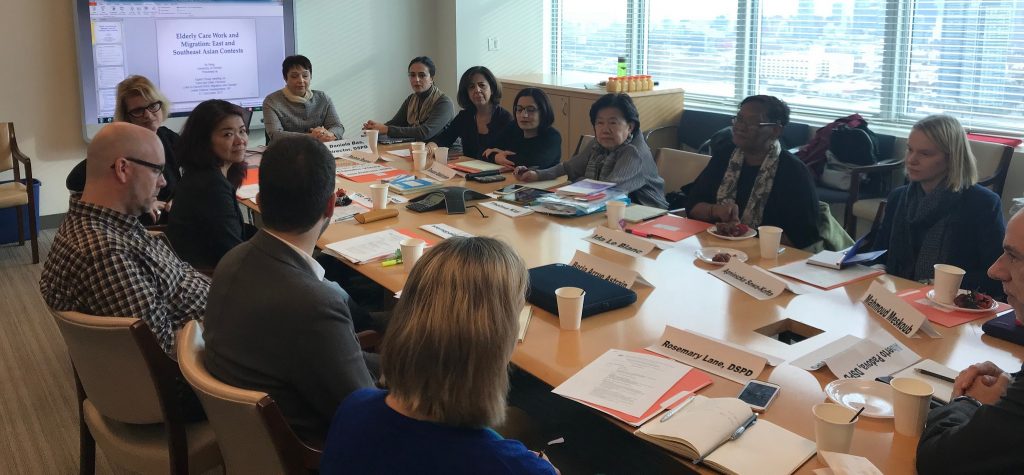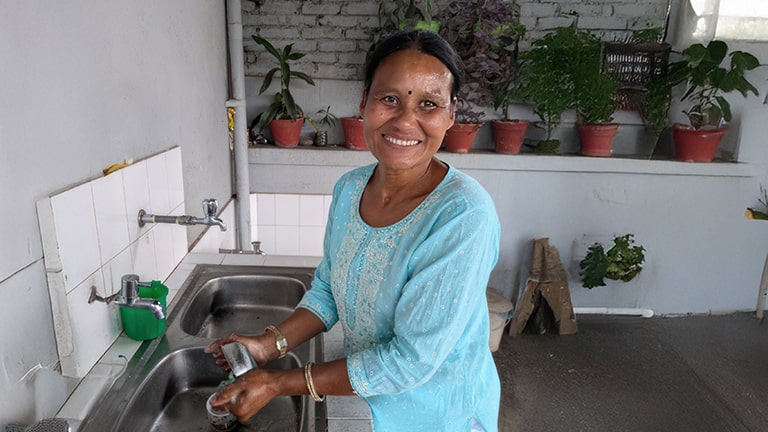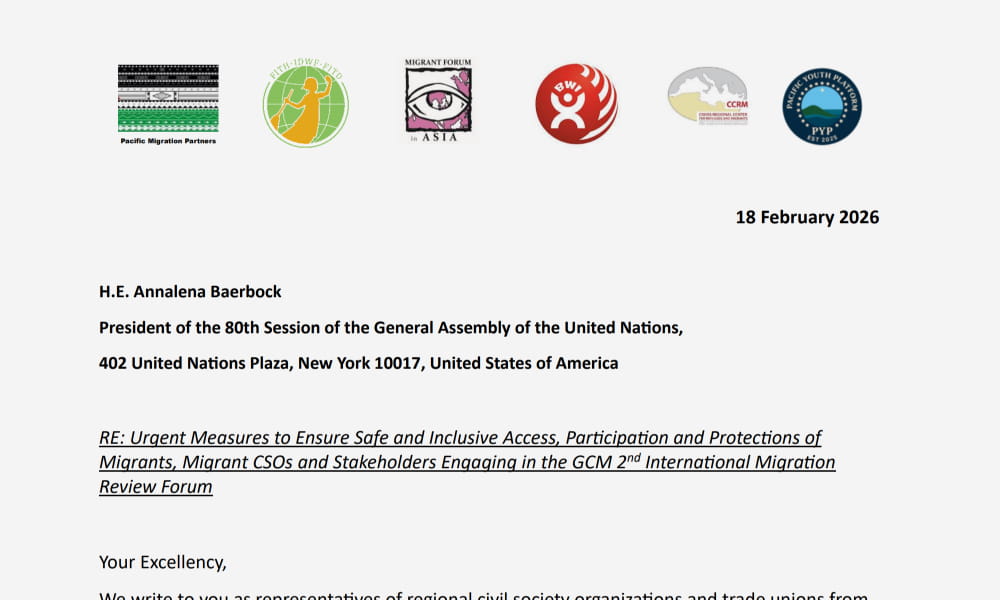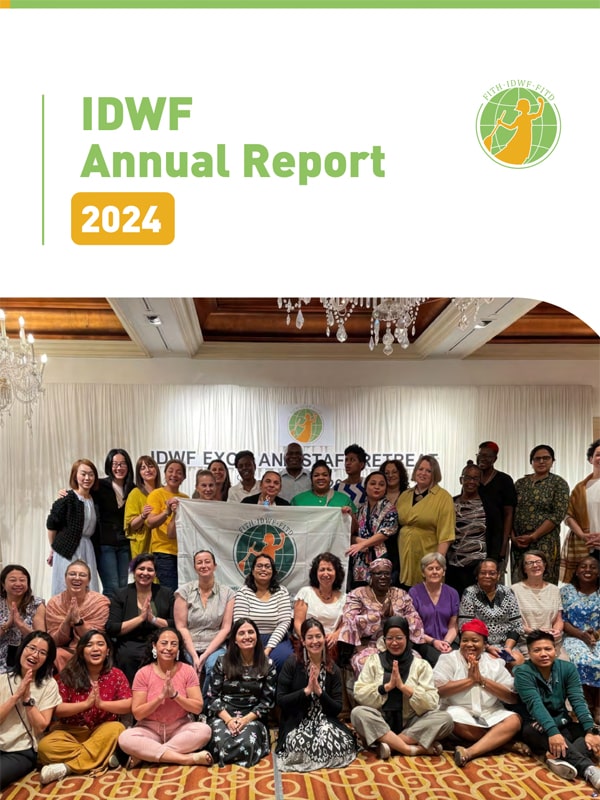Ida le Blanc, General Secretary of National Union of Domestic Employees (NUDE) participated the Expert Group Meeting on “Care and Older Persons: Links to Decent Work, Migration and Gender” held in New York during December 5 to 7, 2017 and shared her thoughts on “Care and Decent Work: Preparing Caregivers for the Future of Work”.
Details
CARE AND DECENT WORK
PREPARING CAREGIVERS FOR THE FUTURE OF WORK
Expert Group Meeting on Care and Older Persons: Links to Decent Work, Migration and Gender
Ida le Blanc
General Secretary
National Union of Domestic Employees (NUDE)

On behalf of the executive and members of the National Union of Domestic Employees (NUDE) and the Board and members of the Service Workers Centre Co-operative in Trinidad and Tobago in the Caribbean. I wish to sincerely thank the UN DESA for the opportunity to be part of this expert group meeting on “Care and Older Persons – links to decent work, migration and gender. I also wish to extend greetings to all the other experts and everyone present today to participate in this historical discourse.
I speak today in my capacity as the General Secretary of NUDE, with over two decades and more of experience working with and on behalf of domestic workers, nationally, regionally and internationally. We have fought together with other domestic workers and their organisations from around the globe and we have won some victories together for domestic workers everywhere and we are still seeking to win many more to ensure a decent life for the domestic workers.
Our membership in the National Union of Domestic Employees (NUDE) is made up of domestic workers who work as housekeepers cleaners, cooks, gardeners and care givers; and other low income workers in the informal sector, both women and men who all face challenges in the workplace and have joined NUDE for representation in disputes that arise in the workplace and others who join to organise themselves to challenge the many injustices they face daily in the workplace. Our objective is to secure the best quality of life for our members by organizing, providing effective representation, skilful negotiation, aggressive advocacy and continuous programmes of training and education for the personal development of the worker and her/his family.
Our members who work as care givers, provide caring services to the elderly, individuals in their private homes and in homes for the aged (which are sometimes registered and in most instances, are not registered, and are run by sole traders, NGOs and religious groups in particular), our membership also includes those who are employed through the government run assistance program, we call them subsidized care givers (they care for the elderly in their homes and is paid a stipend by the government). They have different names for caregivers, they are called nurses aides, geriatric workers, companions, nannies and child minders when they care for children and the most famous name that was adopted by the employers is “helpers”.
It is no easy task organizing workers in general, my respectful view is when it comes to unionization there is no difference between low income workers, whether they are domestic workers or store clerk or it is the man working in the sand pit, or the factory worker in the processing plant, what they all have in common is the fear of losing their job, the fear of the employer knowing that they have joined the union their economic background is the same, they all receive low wages that do not reflect the value of their skills and the job they perform, they must work overtime in order to make ends meet and are usually not at home to supervise their children.
We seek to address these problems through outreach programs to sensitize the domestic workers and the public on the rights of domestic workers and responsibilities of the employers of domestic workers, through the distribution of pamphlets in shopping malls, at churches, and residences. Training and education, through our Know Your Rights program, where we invite the different officers of the Ministry, whether it is the National Insurance officer to inform us of our rights and responsibilities under the social protection scheme, or the labour inspectorate division officers to inform the members of their rights and entitlement under the Minimum Wages Act. The Co-operative Division on the role and functions of Co-operatives, and the International Labour Organisation to sensitize workers on who is the ILO and what they do. Recently we have partnered with the Ministry of Labour and Small Enterprise Development in their outreach programme to sensitize the public on the rights of the domestic workers and a public call to treat domestic workers with respect for the important contribution they make to society in paid, under paid and unpaid work.
We have also partnered with the trade union movement and the Network of NGOs to bring visibility and support for domestic workers and other low income workers by hosting International Women`s day for the first time in our town of Arima. We have won several cases for domestic workers in instances of violation of the Minimum Wages Act and the Maternity Protection Act in our country. We publicise our issues always informing the public of what we are doing, on television, radio, newsprint, we now have social media which we use to get visibility. The media is an important actor in bringing visibility and ensuring the voice of the domestic workers are heard, we must get the support of the media.
The ILO estimates that worldwide, there are 962 million people aged 60 or over in the world, a population that is growing faster than all younger age groups and over the next few decades, the increase in the number of older persons is almost inevitable, with a projection to reach 1.4 billion in 2030 and 2.1 billion in 2050. They provide important services for household economies, yet their work is undervalued and are poorly paid in most cases.
There are two categories of aged persons who require care services, those who are bedridden and cannot take care of themselves and those who are able to take care of themselves physically but needs the care provider to take care of their social needs e.g. housing, prepared meals, assistance with medication, usually homes for the aged arrange outings for the elderly as part of the care and attention that some homes provide.
Bed ridden patients need special and additional care, this type of work is more skilled and physical as it entails a lot of lifting, bending and stooping, caregivers say there is a technique in how you turn your patients and even the way you lift them so one needs to be also trained in Safety and Health in preparation for this job. These patients sometimes need round the clock attention which involves shift work.
Our members complain that they are abused by the relatives of the elderly patient, when they work in private residences, they are expected to take care of the family. In listening to complaints some workers said, “they will abuse you verbally and discriminate against you according to the colour of your skin.” Racism is a major factor as one of the challenges caregivers has to face. “When the patient is racial it could cause you to lose your work” she continued “…and a reference is not easy to get when you need a recommendation to get another job.
“They find all kinds of faults with you as an excuse to send you home”. Another caregiver said the higher class are more disrespectful, the whole family discriminates and abuse you. You have to take orders from the children and the parents. She said the Middle class is more easy to work for. Another caregiver said that the gardener is treated differently. The gardeners are usually paid more and he is treated with some manner of respect.
Another complaint was that sometimes the patient would spit on you and you just have to smile because your children are depending on you to take care of the family and if you complain you are sent home and you are told that the patient is not comfortable with you. The relatives of the patient do not intervene in these instances and even indecent touching is usually a joke for the relatives of male patients who make these advances. Sexual Harassment is usually bypassed by the employer because of the patients age, and caregivers are expected to excuse them. The employers sit by and say nothing. The psychological and emotional abuse is usually overlooked.
The Director General of the ILO has stated that the four pillars of the Decent Work Agenda are crucial to advancing the entire sustainable development agenda. The four pillars that could promote jobs and enterprise, guarantee our rights at work, extend social protection and promote social dialogue, with gender as a cross-cutting theme.
Despite the importance of care work they continue work for low wages, and face the daily exploitation and discrimination in its many forms, with employers who refuse to abide by the Minimum Wages legislation that exist to protect domestic workers, with insufficient policing/monitoring of Labour Legislation to ensure adherence to the law. There is also the non adherence to the National Insurance System which denies domestic workers and other low income workers the right to social security benefits that other workers enjoy.
Because of the many deficits of decent work and the many years of advocacy for the protection of domestic workers under the Industrial Relations Act (IRA) without success, NUDE conceptualized The Service Workers Centre Co-operative a workers` co-operative that can provide a way out of these precarious and informal working arrangements.
Two of the main objectives of establishing the co-op are to provide opportunities for its members to access continuous and decent work and to provide the general public with services that are fairly priced and of a high standard. The Domestic Workers` Co-Operative provides a vehicle towards getting decent work by securing contracts for work to its membership, that is productive with a living wage, ongoing training for the personal development of its membership through the co-operative efforts and the ability of members to take control and manage their own workers` co-op, which allow them to make decisions through a democratic process.
Through training and education with the support of the ILO COOP Division Domestic workers are able to assert themselves and negotiate with confidence their wages for jobs that are requested from the coop. They are now trained to perform site visits and make up their work schedule and are able to use their model contract (which was finalized at a validation meeting that was facilitated by the ILO with domestic workers, trade union and employer in attendance) when agreement is reached between the
domestic worker on behalf of the co-op and the client/homeowner. Being part of the co-operative would also enable them to raise complaints if they are physically or verbally abused and would ensure that dismissals are based on legitimate concerns following a proper investigation. Care Workers would no longer be vulnerable due to isolation. The training and the development of the contract can be used as a model contract for all domestic workers whether a housekeeper, a care giver, or a cleaner.
In closing I want to reiterate the importance and potential benefits of the worker-owned cooperative structure for domestic workers which enables a group of workers to join together for increased voice and recognition. In addition to increased solidarity with regards to the bargaining power, these cooperatives can provide opportunities for income generation, democratic self-government and management and entrepreneurial skills, skills and services which members need themselves such as child care, care for the elderly, social protection or an increased access to other service providers.
Cooperatives can also offer access to key services, including housing, low cost consumer goods and financial services. In addition, research shows that women in cooperative contexts practice democratic and participatory decision making, and take on leadership roles in the organizations, and in their communities. Hence cooperatives can help empower women and contribute to reducing gender inequalities in community decision making processes.
We call on all State parties and International Agencies to support care and encourage care. They should play a greater role in care provision, both to eliminate gendered expectations for care provision within families and to subsidize provision due to the expense of and demand for high-quality care.
As the primary stakeholder of providing care and the protection of care workers, we must be able to speak for our membership and participate in social dialogue at the National, Regional and International level. We need to partner with government and other International agencies for additional training for care givers in preparation of geriatric care as it is sometimes called and the need for the upgrading of skills to ensure professional care giving in particular the psychological and emotional aspect of the job.
More young people should be targeted to prepare them with the skills for careers in care giving. There must be an increase in sensitization of young people and the public in general about the ageing process and help them, through training and field visitation, to develop practical skills in geriatric care.
Continued support for NUDE and the Service Workers Co-operatives as a model to co-operatives everywhere and hoping in the future we can have our own Care Centre providing care services to the Elderly and children because our membership possesses all the skills to run the home efficiently and have been working in homes and with individuals for many years, the co-operative will assist to run the business of care giving for themselves, owned and operated by them.
However our burning issue remains the same the exclusion of domestic workers who work in and around the home and is paid by the householder, must not be considered as a worker. We were able to get CEDAW to make recommendations to our government, but the issue remains the same and we cannot sit back and wait so we have took the matter into our hands by preparing a vehicle for low income workers to make their career in care giving providing them with the skills to move forward.
THANK YOU!
Source: “Care and Decent Work: Preparing Caregivers for the Future of Work” by Ida le Blanc






